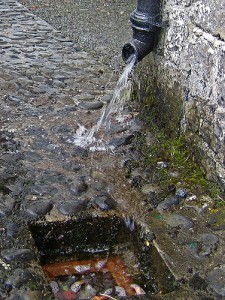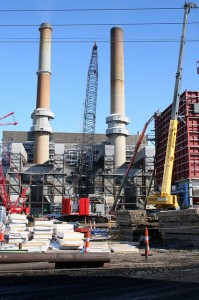Did Portland glass factory pollute groundwater?
Oregon state environmental regulators aren’t done looking at Bullseye Glass, the Portland glass factory at the center of an air quality issue in that city. The Oregon Department of Environmental Quality now says that rainwater runoff from the factory’s roof may have deposited toxic heavy metals into the soil and groundwater near the furnace.
Investigators sampled the contents of dry wells on the company’s property and found some contaminants in concentrations as much as 33 times as high as federal limits for drinking water. While the runoff is not used for drinking, it does eventually filter into the groundwater, which may be used for drinking. Regulators are sampling the groundwater around the facility to test for the presence of heavy metals.
The roof runoff has been directed into the company’s dry wells for years, leading to the possibility of substantial contamination of the soil around the glass furnace. In addition to the toxic runoff, regulators also found about two feet of highly contaminated sediment at the bottom of the dry wells. Some of the concentrations of contaminants in the sediment were found to be thousands of times higher than the maximum allowable federal standards.
According to test results, the sediment in the dry well contained excessive levels of cadmium, lead, arsenic, hexavalent chromium and selenium. The dry well has been capped for some time, however the sediment in the well accumulated there over a period of more than 20 years. Bullseye Glass built the dry well in question in 1992, during an expansion of the company’s facilities.
The investigation was spurred by complaints that the glass furnace was improperly disposing of unwanted materials. Investigators found glass from the factory in manholes adjacent to the company’s property. The company was fined $600 and warned not to deposit any impermissible items in the city sewers. As part of the investigation, the city also looked at how materials, including rainwater runoff, are disposed of.
The company was also cited for faulty equipment cleaning practices that caused powdered glass fragments to be deposited on the company’s roof. Glass crushers were routinely cleaned out with compressed air, and the pulverized glass particles from the crushers was exhausted to the roof. The pulverized glass particles were then dispersed into the air, and washed off the roof into the sediment layer of the company’s dry wells.
Pending the outcome of the investigation, it is likely that Bullseye Glass will be required to develop a treatment plan for rainwater runoff that addresses the collection of heavy metals. The findings are significant because it is at least somewhat likely that other glass furnaces have contaminated soil around their facilities by improperly treating or discharging rainwater.
Glassprimer™ glass paint is a specialized glass coating that bonds permanently to glass surfaces. GlassPrimer also makes a glass surface molecular activator that is designed to work with UV-inkjet glass printing processes. For more information about Glassprimer™ glass paint, please visit the rest of our site. If you’d like to purchase Glassprimer™ glass paint, please visit our online store.
Photo Credit: Pearl Pirie, via Flickr.com


